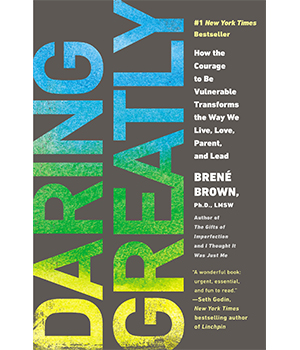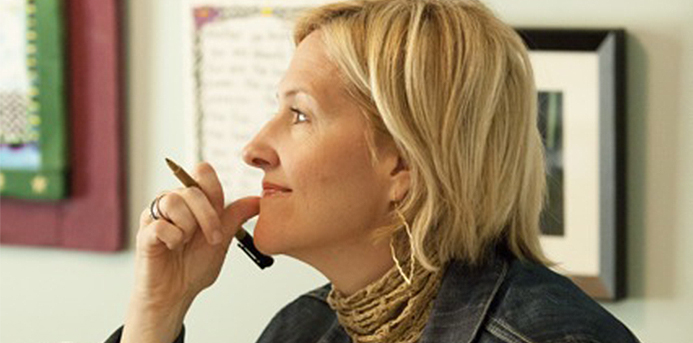The line for the most recent Family Action Network talk stretched out of New Trier’s auditorium, around the corner and down the block. The eager crowd was there to see Brené Brown, author of the New York Times best-seller “Daring Greatly.” A man paraded past ticketholders wearing fluorescent “notice me” colors, while waving a large cardboard sign begging for a ticket and pointing out that he was making himself vulnerable to earn it.
 It was the hottest ticket in town because Brown, a research “rock star” who studies vulnerability and courage, is the author of three New York Times No. 1 best-sellers as well as a presenter of one of the top five most-watched TED Talks of all time, with more than 21 million views. Her message went viral when she decided to share her personal experience while discussing her findings about vulnerability.
It was the hottest ticket in town because Brown, a research “rock star” who studies vulnerability and courage, is the author of three New York Times No. 1 best-sellers as well as a presenter of one of the top five most-watched TED Talks of all time, with more than 21 million views. Her message went viral when she decided to share her personal experience while discussing her findings about vulnerability.
Dare Greatly
When her TED talk catapulted from two to 2 million views, both Brown’s husband and therapist urged her not to read the posted comments – which is, of course, what she immediately did. There were criticisms levied against everything from her weight to the school at which she earned her PhD. It sent Brown into a shame spiral.
“I’m trained as a social worker, I know how to handle traumatic events – with eight hours of ‘Downton Abbey’ and a jar of peanut butter,” she jokes.
Coincidentally, it was Brown’s interest in “Downton Abbey” that led her online to learn about the era in which the show is set. She found the 1910 quote from then-president Theodore Roosevelt that would change her life.
Roosevelt said: “It is not the critic who counts; not the man who points out how the strong man stumbles, or where the doer of deeds could have done them better. The credit belongs to the man who is actually in the arena, whose face is marred by dust and sweat and blood…who at the best knows in the end the triumph of high achievement, and who at the worst, if he fails, at least fails while daring greatly.”
It was then that Brown vowed to live in the arena, to live a courageous life.
Consider Whose Opinion Matters
Brown describes her resulting book, “Daring Greatly,” as the journey from “what will people think” to “I am enough.” She says to those who criticize, “If you’re not in the arena getting your ass kicked on a daily basis, then I’m not interested in your feedback.”
Similarly, Brown encourages others to avoid playing “small,” noting that when we let fear keep us from sharing our gifts with the world, we become resentful. When it comes to others’ opinions, there’s a fine line between caring so much that we lose ourselves, and not caring at all, resulting in the loss of our capacity for connection.
Try this: Take a 1-inch x 1-inch square of paper and make a list of people whose opinions matter to you – those people who love you, not in spite of, but because of your vulnerabilities and imperfections. Brown says, “If you need more paper, you need to edit.”
Then Rise Strong
In hundreds of thousands of pieces of data, Brown didn’t find a single example of courage without vulnerability. “If you’re brave enough, often enough, you will fall,” Brown says. “That is the physics of vulnerability.” What about those who fall and get back up with more tenacity than before? What do they have in common? To find out, Brown interviewed entrepreneurs, leaders, active duty special operatives, veterans, and creators.
One line emerged that she credits with saving her life: Here’s the story I’m telling myself right now. Our brains are wired to resist ambiguity. When we have an emotional response, our brains scramble to create a narrative that makes sense of the situation. For example, she didn’t wave because she’s mad that I haven’t called her back or he canceled because he’s not interested in meeting. Our brain rewards us – regardless of the accuracy of our reasoning.
“We are emotional beings who – on occasion – think,” Brown says. She discovered that those who “rise strong” practice a three-part recovery process:
1. Mindfulness and Breathing
Instead of letting emotions take over, stop, breathe and review or check the facts of the story you’re telling yourself. Brown’s example was that of her husband peering into the fridge and saying, “We don’t even have any damn lunchmeat in the house.” The story she told herself was that it was her fault and she was failing as a wife, mother and leader because she was too busy. The truth was that her husband was simply hungry; the comment had nothing to do with her.
Try this: Breathe in for four seconds, hold for another four, breathe out for four and hold again for four. Practice this “box breathing” routinely to create a positive change in your physiology.
2. Write It Down
In her book “Bird by Bird,” Anne Lamott describes the first step in a writer’s process of getting a story out and onto the page as a “shitty first draft (SFD).” It’s a necessary part of the process, but it’s not the whole process. Of the men and women who rise to success the fastest, 70 percent stop and write down when they’re overcome by their feelings. They recognize that these are simply SFDs – not their final story.
Try this: Next time you catch your emotions running wild, make a note of it; not “a thesis” says Brown, just three lines or so. After some time, review your SFDs and you’ll likely see a pattern.
3. Craft Your Own Plotline
“These stories we tell ourselves are dangerous because they dictate our cognition and behavior,” Brown says. By holding up the story we created against the story we want to write, we create the chance to bridge the gap. We can’t let our SFDs own and define us; we can create our own endings.
Brown reminds us that, “Failure is an imperfect word because the moment you learn from it, it ceases being a failure and becomes a lesson instead. To show up and be seen in a harsh and unforgiving world can be frightening, but it’s not as scary as getting to the end of our lives and asking, ‘What if I would have shown up?’”
Start with deciding to choose courage over comfort, kind of like our friend with the sign asking for a ticket – he got a great seat.

